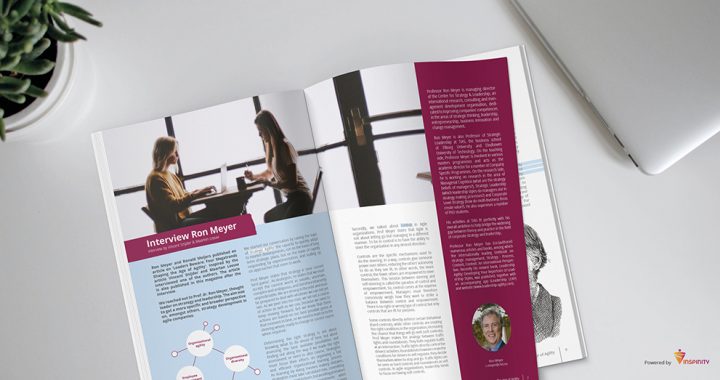Ron Meyer and Ronald Meijers published an article on ‘Leaders Beware: Four Megatrends Shaping the Age of Agility’. Inspired by the article Vincent Snijder and Maarten Leeuw interviewed one of the authors. We reached out to Prof. dr. Ron Meyer, thought leader on strategy and leadership. The aim was to get a more specific and broader perspective on, amongst others, strategy development in agile companies.
We started our conversation by raising the topic of Strategic Agility; the capacity to quickly adapt to market developments, not on the basis of long term strategic plans, but on the basis of rapidly responding by experimentation, and scaling up on approaches that seem to work.
Prof Meyer states that strategy is ‘your current best guess’. As strategists, he states that we must accept the current world as volatile, uncertain, complex and ambiguous, and therefore inherently unpredictable. We are driving in the mist and must be prepared to deal with whatever we can not yet see. As we peer into the mist, we set out a course of action as well as we can, because we need to keep moving forward. But we know that these actions are based on our best possible guess at that moment in time, so we need to hold on to the steering wheel, ready to change or correct course when required.
Determining the right strategy is not about knowing what to do ahead of time, but about assessing the best available possibilities and finding out along the way if we made the right assessment or need to alter course. Strategists must focus their efforts on organizing a fast and efficient organizational learning process. As learning by doing involves making mistakes, strategists must take calculated risks, committing enough resources to learn, but avoiding premature commitment of large investments when unpredictability is high. An organization’s strategy should never be fixed, but must constantly adapt on the basis of unfolding insights and unfolding alignment.
Secondly, we talked about control in Agile organizations. Prof. Meyer states that Agile is not about letting go but managing in a different manner. To be in control is to have the ability to steer the organization in any desired direction.
Controls are the specific mechanisms used to do the steering. In a way, controls give someone power over others, reducing the others’ autonomy to do as they see fit. In other words, the more control, the fewer others are empowered to steer themselves. This tension between steering and self-steering is called the paradox of control and empowerment. So, control comes at the expense of empowerment. Managers must therefore consciously weigh how they want to strike a balance between control and empowerment. There is no right or wrong type of control, but only controls that are fit for purpose.
Some controls directly enforce certain behaviour (hard controls), while other controls are creating the right conditions in the organization, increasing the chance that things will go well (soft controls). Prof Meyer makes the analogy between traffic lights and roundabouts. They both regulate traffic at an intersection. Traffic lights directly control the drivers’ activities. Roundabouts however create the conditions for drivers to self-regulate, they decide themselves when to stop and go. Traffic lights can be seen as hard controls and roundabouts as soft controls. In agile organizations, leadership tends to focus on having soft controls.
About Ron Meyer
Professor Ron Meyer is managing director of the Center for Strategy & Leadership, an international research, consulting and management development organisation, dedicated to improving companies’ competences in the areas of strategic thinking, leadership, entrepreneurship, business innovation and change management.
Ron Meyer is also Professor of Strategic Leadership at TIAS, the business school of Tilburg University and Eindhoven University of Technology. On the teaching side, Professor Meyer is involved in various masters programmes and acts as the academic director for a number of Company Specific Programmes. On the research side, he is working on research in the area of Managerial Cognition (what are the strategy beliefs of managers?), Strategic Leadership (which leadership styles do managers use in strategy making processes?) and Corporate Level Strategy (how do multi-business firms create value?). He also supervises a number of PhD students.
His activities at TIAS fit perfectly with his overall ambition to help bridge the widening gap between theory and practice in the field of corporate strategy and leadership.
Professor Ron Meyer has (co-)authored numerous articles and books, among which the internationally leading textbook on strategic management, Strategy – Process, Content, Context: An International Perspective. Recently his newest book, Leadership Agility: Developing Your Repertoire of Leadership Styles, was published, together with an accompanying app (Leadership LEAP) and website (www.leadership-agility.com).
